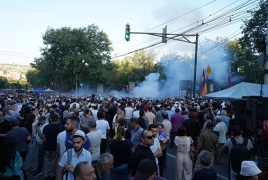
In its annual report, Amnesty International recorded that Armenian police "in some cases used unlawful force" against protesters.
The section on Armenia in the 2024 global human rights report highlights that during demonstrations in April and May demanding the Prime Minister's resignation, police on multiple occasions unlawfully used force, reports "Azatutyun."
On June 12, clashes broke out in downtown Yerevan between police and protesters opposing border demarcation. According to reports, 101 people, including 17 police officers, were injured, and 98 were detained. At least 15 detainees were later charged with disturbing public order and hooliganism. No police officers were charged following an investigation into the lawfulness of their actions.
Human rights defenders also emphasized the pressure faced by journalists during the spring protests.
"Demonstrations in April and May were accompanied by growing incidents of threats and insults against journalists. According to the Committee for the Protection of Freedom of Expression, 14 media representatives were harmed while covering the protests, facing targeted attacks, crowd surges, and, in some cases, assaults by police," Amnesty International reported.
The organization also noted the arrests of opposition figures Vazgen Saghatelyan and Narek Samsonyan, who were detained on March 22, 2024.
"The two men were charged with making obscene statements about Prime Minister Nikol Pashinyan and other ruling party members on the AntiFake website. Their trial began on September 23. If convicted, they could face up to five years in prison," the report states.
While analyzing the situation in Armenia, the report also mentions continued tensions with Azerbaijan.
"Post-conflict tensions with Azerbaijan remain a factor fueling internal political unrest in Armenia," the report notes, referring to the border delimitation process that started in May.
Amnesty International stated that under the border demarcation agreement with Baku, four villages in Tavush Province remained on the Azerbaijani side.
The report also highlights the difficult situation of displaced Armenians from Nagorno-Karabakh, noting that they still face serious challenges in Armenia.
"The government continues to struggle with integrating over 100,000 refugees who fled Nagorno-Karabakh after Azerbaijan established control in September 2023. Housing, employment, and education remain major issues for many of them. Their right to a safe and dignified return has not been realized," Amnesty International stated.
The report further addresses Armenian-Azerbaijani relations, noting in its Azerbaijan section:
"Progress in peace talks was achieved in August when Azerbaijan agreed to drop its demand for the 'Zangezur Corridor' from the negotiations agenda. However, Azerbaijan's new demands, including changes to Armenia's Constitution and removing references to Nagorno-Karabakh, as well as ongoing border disputes, further complicated efforts toward a final settlement," the authors conclude.

